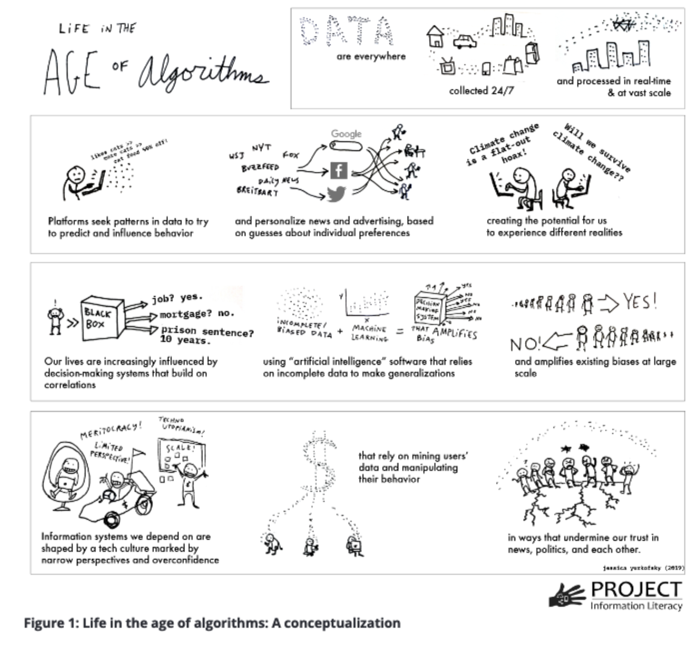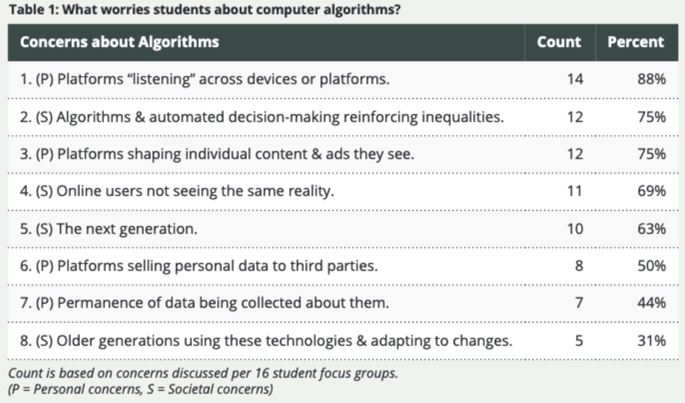Project Information Literacy Publishes New Report on Information Literacy and College Students in the Age of Algorithms
From the Report’s Executive Summary:
At the dawn of a new presidential election year, many of the nation’s youngest educated voters are approaching the race deeply skeptical of the news and information they get through internet giants like Google, YouTube, Instagram, and Facebook. This newest generation of college students, who came of age with social media, recognize that the hidden levers of algorithms that cull information from a crowded and chaotic landscape of truth, “likes,” misinformation, and spin, could, if left unexamined and unchallenged, threaten representative democracy and the cultivation of informed and engaged communities.
That is one of the findings of anew national research study by Project Information Literacy (PIL), a nonprofit research institute, which has spent more than a decade surveying the research habits of college students in an increasingly digital world. In this latest study, PIL examined the awareness and concerns of college students in the age of algorithms. In the yearlong, comprehensive study, commissioned by the John S. and James L. Knight Foundation and The Harvard Graduate School of Education, 103 students in focus groups and 37 faculty from eight colleges and universities from across the country were interviewed.
Researchers found these educated young adults, who could help swing the country in a new direction, are coming of age cautious and curious about the implications of a dramatically changing information landscape where targeted ads are the norm, and objective news coverage gets harder to tell from opinion. Political observers are watching young voters closely in a year when voter turnout is expected to be the highest in more than a century.
“Even though students can’t explain how algorithms work,” Dr. Alison Head, the study’s lead researcher said, “they definitely feel the impact of personalization, since they are inundated by ads, news stories, and other information pushed onto their screens throughout each day.”
While some students trade privacy for convenience in order to get customized results based on their preferences, many more are indignant about websites that mine their clicks to sell them products, or worse yet, chase them across platforms and devices with content. And yet, students are resigned to algorithmic control, since abandoning sites like Google, Amazon, and Instagram is unthinkable for most of them. As one student summed it up, “It’s a horrible totalitarian hellscape, but it’s kind of the best we can reasonably expect.”
The study’s findings include:
- It takes reading across different content producers to get the full story and break out of news bubbles, according to students. And while this take lots of their time and effort, it can still be difficult to know where to place their trust. As one student put it, “You’re getting people’s opinion on what happened versus what actually happened.”
- Students are far more eager than their faculty to shield their browsing activity against the constant stream of unwanted ads. Practical strategies, like running a Virtual Private Network (VPN) to shield their browsing activity and protect their privacy are learned from relatives and peers, but not in class.
- Choosing news online is a tricky prospect, so some students have figured out how to use social media sites, like Twitter and Reddit, as their “news editors” to help them exert a little control and break out of filter bubbles.
- In stark contrast, college and university faculty stick to a narrow set of information sources, like The New York Times or NPR, and rely on the walled-garden of peer-reviewed journal articles, avoiding social media platforms for news.
- Students feel their education does little or nothing to help them find trustworthy information in the torrent of news and opinion they encounter daily, and prefer to depend on themselves for navigating a changed and challenging information landscape.
- Both students and faculty are largely unaware that systems they used in their courses, like Canvas, the popular learning management system (LMS) had the potential to gather, aggregate and sell personal information.
While many students worry about how the next generation will fare in terms of disinformation, privacy, and personal well-being in the coming decade, findings from this study suggest that they do not fully understand how big data and artificial intelligence (AI) are being used by systems used throughout society to decide who gets into college, a loan, or a job interview. Faculty take a long view and are alarmed about the social impact of internet giants; as one instructor put it, “The genie is being let out of the bottle and it is a problem we’re stuck with now.” Yet few instructors address it in the courses they teach.
This study was conducted in the wake of coverage of the Cambridge Analytica scandal about powerful algorithms trawling through 87 million people’s Facebook profiles to sway voters during two hotly contested campaigns: support for Brexit in the U.K. and the presidential election of Donald Trump in the U.S. in 2016.
“Algorithms have clearly entered the public conversation, but our findings suggest that current information systems, and the social and economic conditions that shape their design, rarely get discussed in the classroom,” Head said. “This must change as AI, big data, and machine learning get used to make automated decisions that have profound real-life consequences and reinforce societal inequalities.”
The study includes commentaries from leading experts around the country, as well as extensive recommendations for education and information-industry professionals. Co-researchers on the multi-disciplinary study were: Barbara Fister, a Scholar in Residence at PIL and an Emerita Professor at Gustavus Adoplphus in Minnesota and Margy MacMillan, a Senior Researcher at PIL and an Emerita Professor from Mount Royal University in Canada.
Project Information Literacy (PIL) is a national nonprofit research institute based in the San Francisco Bay Area that studies what it is like to be a student in the digital age. In a series of 11 groundbreaking scholarly research studies, PIL has investigated how high school, college students, and recent graduates utilize information competencies, skills, and strategies for completing course work and solving information problems in their everyday lives.
Resources
More From Project Information Literacy
“How Students Engage with News” (October 16, 2018)
“What Information Competencies Matter in Today’s Workplace? (May 13, 2013)
“How College Students Manage Technology While in the Library During Crunch Time” (October 13, 2011)
Filed under: Data Files, Interviews, Journal Articles, Libraries, Management and Leadership, News, Profiles, Video Recordings
About Gary Price
Gary Price (gprice@gmail.com) is a librarian, writer, consultant, and frequent conference speaker based in the Washington D.C. metro area. He earned his MLIS degree from Wayne State University in Detroit. Price has won several awards including the SLA Innovations in Technology Award and Alumnus of the Year from the Wayne St. University Library and Information Science Program. From 2006-2009 he was Director of Online Information Services at Ask.com.




